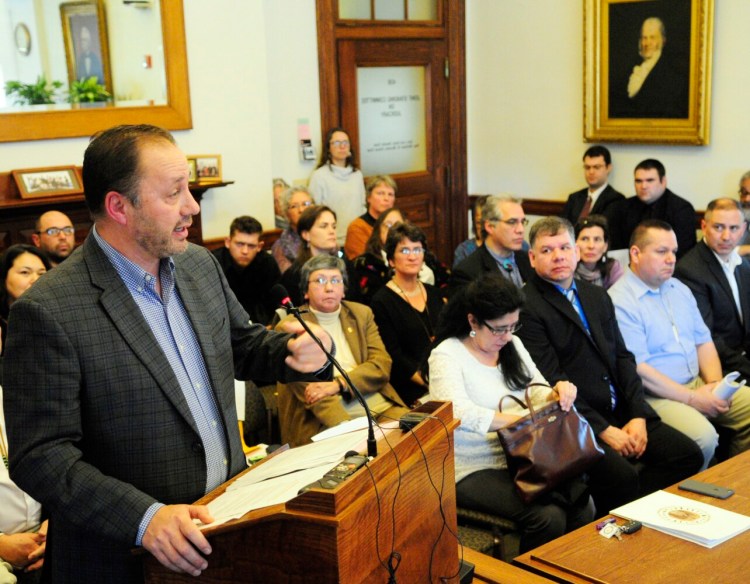AUGUSTA — Leaders of Maine’s Native American tribes are pressing for major changes to a nearly 40-year-old settlement agreement that they say fails to respect tribal sovereignty or allow native communities to thrive economically.
Tribal chiefs met with lawmakers and representatives of the Mills administration in Augusta on Monday to begin discussing potential changes to the 1980 Maine Indian Claims Settlement Act ahead of the landmark agreement’s 40th anniversary.
The task force aims to build on recent progress in repairing relations between the state and tribal communities. Many of those long-running tensions over issues such as fishing rights, court jurisdiction and gambling enterprises are rooted in differences of interpretation over the 1980 agreement.
The tone of Monday’s first task force meeting was congenial as each member expressed an eagerness to work together on improving state-and-tribal partnerships. But leaders of the four tribes – the Passamaquoddy Tribe, the Penobscot Nation, the Houlton Band of Maliseets and the Aroostook Band of Micmacs – made clear that they feel the 1980 agreement has failed their communities.
“This is a document that we are now four decades into, with enough of a history and a track record to know that this was a failed experiment,” Penobscot Nation Chief Kirk Francis said. “I think that the Land Claims Settlement is a stagnant document that doesn’t move in real time with the progress and the uptick in activity of tribal governments and what we can do.”
The 1980 agreement provided the Penobscot, Passamaquoddy and Maliseet tribes with $81.5 million in federal dollars, the bulk of which the tribes used to buy back about 300,000 acres in exchange for ending future land claims against the state. But the settlement also led to disagreements over state jurisdiction and tribal sovereignty.
Vice Chief Maggie Dana of the Passamaquoddy Tribe’s Pleasant Point reservation said the settlement agreement was “supposed to be a living document” that could be changed or amended with the times. But that hasn’t happened in the past 40 years, Dana said.
“The tribes just want to flourish and not be limited,” Dana said.
Chief William Nicholas Sr. of the Passamaquoddy Tribe at Indian Township said his top goal for the task force is for the state to finally recognize “the inherent sovereign rights” of all four tribes.
“If it was recognized from the beginning, we wouldn’t be sitting here today talking about whether or not we can have our rights – which are our rights – given back to us because really that’s what this is about,” Nicholas said. “We don’t need anybody to make decisions for us. We can do that for ourselves. We can be partners in economic and social growth in the state Maine, if we can just be recognized as such.”
After years of deteriorating relations, there is a sense of optimism in Augusta and among tribal leaders that the environment is changing for the better.
Gov. Janet Mills made good on her campaign and inaugural pledges to work closely with tribal leaders on issues. In addition to appointing a senior adviser on tribal affairs, former Penobscot police chief and legislative representative Donna Loring, Mills signed bills banning Indian mascots or nicknames in schools and renaming Columbus Day holiday as Indigenous People’s Day.
Despite clashing with the tribes in the courts, Mills signed into law some of the nation’s most protective water quality standards on newly designated “sustenance fishing” waters. And she approved the task force that met for the first time Monday, sending several members of her Cabinet or staff to attend.
Sen. Michael Carpenter, a Houlton Democrat who formerly served as attorney general, acknowledged that it is likely impossible for the group to resolve the entire “smorgasbord” of complicated issues by the December deadline. But he suggested the group could continue to meet next year, if they show solid progress.
“I think there’s an opportunity here … to make some meaningful changes in the relationship,” Carpenter said.
Chief Clarissa Sabattis of the Houlton Band of Maliseet Indians said in other states, tribes often serve as partners by bringing in resources or economic development to regions struggling economically.
“I’m hoping that out of this process we’ll have more people that understand the importance of self-determination and self-governance for us and the benefits that can also bring to the state of Maine,” Sabattis said.
Chief Edward Peter-Paul with the Aroostook Band of Micmacs said some state laws have “put us back in the stone age.” The easiest step, Peter-Paul said, is for the state to confer exclusive jurisdiction to the tribes for matters on tribal lands.
Francis from the Penobscot Nation said any changes to the act must address the differences over jurisdiction and sovereignty.
“To me, if we’re not addressing the jurisdictional issues … then I don’t know what we are doing here because that’s where the conflict lies,” Francis said.
Send questions/comments to the editors.




Comments are no longer available on this story